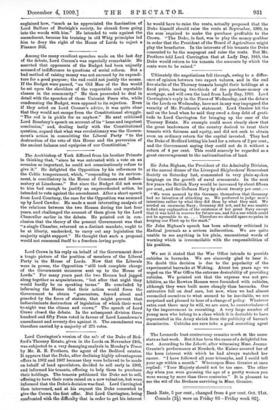The Archbishop of York differed from his brother Primate in
thinking that, "since he was entrusted with a vote on an occasion so important, he could not conscientiously refuse to give it." He delighted the Opposition by his references to the Celtic temperament, which, "responding to its environ- ment, is conciliatory in the House of Commons and inflam- matory at Limehouse." But since the Budget did not seem to him bad enough to justify an unprecedented action, he • intended to vote against the amendment. After a short speech from Lord Courtney, the case for the Opposition was summed up by. Lord Cawdor. He made a most interesting analysis of the relations between the two Houses during the last four years, and challenged the account of them given by the Lord Chancellor earlier in the debate. He pointed out in con- clusion that the theory of the present Government was that "a single Chamber, returned on a distinct mandate, ought to be at liberty, unchecked, to carry out any legislation the majority might support." He thought that such a proposal. would not commend itself to a freedom-loving people.






































































 Previous page
Previous page